Inclusive education and a wheelchair gave Simon, 24, a second chance at school
South Sudanese Simon Peter was out of school for long because he could not reach the classroom. An inclusive education project in Kakuma refugee camp brought him a new chance while teaching teachers and parents how to support persons with disabilities.
Simon Peter is 24 years old but is only in primary class 3. He enrolled in school for the first time ten years earlier after growing up in a rural area of South Sudan. Before that, schools were located too far for him.
Simon was born with hemiplegia. Hemi means “half” and hemiplegia refers to the paralysis of half of the body. He had no wheelchair to help him reach a school. His chance to join school came only when his family moved to a city.
“I never got a chance to socialize and play with other children. I was indoors most of the time”, Simon describes his childhood.
Shortly after Simon started his education, South Sudan slid into a civil war that disrupted his learning. It took a long time before he could enrol again, this time in Kakuma refugee camp in Kenya. Finn Church Aid’s project for supporting special needs education issued him with a wheelchair to help him reach the school.
Simon’s guardian Mark Loyiel is grateful for the opportunity for Simon to catch up with education.
“I used to carry him wherever he needed to go. It is a relief that I can wheel him to school, and he manages the school day by himself while I report to other duties. Then I pick him up after the classes”, he says.
Inclusive education and learning environment
Finn Church Aid’s special needs education project benefits 275 children and youth with disabilities that live in the refugee camp in Kenya. The project has also trained 69 teachers on inclusive education that bridges the language barriers of refugee learners and prepares teachers to meet the needs of learners with disabilities. The support to the learners also includes wheelchairs, stationaries, textbooks, school uniforms and food.
Ensuring an inclusive learning environment also requires construction work. The project has built disability-friendly classrooms and pit latrines in all the primary schools and Early Childhood Development and Education (ECDE) centres in Kalobeyei settlement, a part of Kakuma refugee camp.
When Kenya ordered schools to close due to the Covid-19 pandemic, FCA distributed solar-powered radios to enable Simon and other persons with disabilities to participate in radio lectures. Teachers have complemented broadcasts with home visits and by following up on the homework of learners.
Parents and guardians actively involved in their children’s education
The project has actively involved parents and guardians of children with disabilities in supporting the special needs education, says Simon’s guardian Mark Loyiel. Mark is also happy that the schools include those with disabilities in physical activities, such as ball games. Before the pandemic, they were all cheering in inter-village competitions for learners – with or without disabilities, playing together as one family.
Mark is particularly grateful for the psychosocial support that goes with the project. The staff of FCA visit their home to engage with the family and build a stronger understanding of persons with disabilities.
“We have found new aspects of understanding and respect for Simon’s personality and dignity. Persons with disabilities are not a burden – they are unique human beings like anyone”, he says.
“The home visits of the staff make us feel like we are one family to them.”
Simon Peter has grown much and describes himself as very peaceful. He dreams of becoming a teacher for primary class 1 and wants to teach mathematics and science to children with disabilities.
“I want to give back for the support I have received, and I feel that I know from experience what children with disabilities need when they grow up.”
Text: Elizabeth Oriedi
Career counselling went mobile during school closures in Cambodia
The Covid-19 pandemic closed schools in Cambodia, but in response to the growing need for face-to-face support, career guidance and counselling services went mobile.
The Covid-19 pandemic keeps schools closed and requires students to carry on their studies at home via tools and programs for distance learning. The challenge is that some 60 per cent of the families in Finn Church Aid’s (FCA) target communities do not have access to the TV lessons initiated by the Ministry of Education, Youth and Sport, or to any online learning resources.
FCA had to create alternative approaches to help students get uninterrupted support and maintain their routine in career guidance and counselling activities.
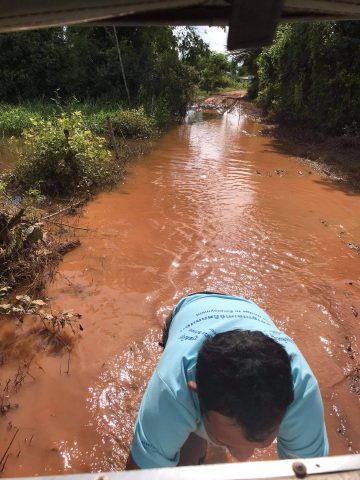
Going through thick and thin when reaching out to support students and their families with distance learning.
The career guidance and counselling services went mobile o respond to the need for face-to-face support. Teachers and school counsellors travel to nearby villages by tuk-tuk to meet the students, conduct lessons, distribute learning materials and provide guidance in various personal and career-related issues. They also discuss with caregivers and other family members of the students and provide advice on distance learning and how they can support their children with home learning.
These Mobile CGC Centers also raise Covid-19 awareness by spreading information on preventive measures such as frequent handwashing, social distancing and advice on wearing face masks.
Text: Sari Turunen
Career counsellors in Cambodia brought learning online – “It has been rewarding”
Developing career counselling and training new career counsellors is an important part of Finn Church Aid’s (FCA) work in Cambodia. Because of Covid-19, all contact teaching was put on hold in March, but Mak Buntith and his fellow career counsellors found new ways to continue working.
30-year-old Mak Buntith was one of the first career counsellors to graduate in Cambodia. For the past five years, he has worked as a career counsellor in a high school in Anlong Vil in Battambang province. His work also includes training new career counsellors and offering them support and mentoring.
”I applied for the training because I thought that as a career counsellor, I could offer new opportunities to the lives and futures of young people. It was also a chance for me to try something new,” he says.
In Cambodia, many children drop out of school. One of the reasons is that young people do not have enough information about their study or career options, and their families are unable to support them in these matters. Career counselling helps pupils recognise their own strengths and make plans concerning their studies and possible career paths.
“Career counselling has even changed me as a person. I have learned to deal with my emotions and to think critically. My communication skills have improved, thanks to training and experience,” says Buntith.
Career counsellors available online and over the phone
In mid-March, schools in Cambodia closed due to coronavirus. In rural parts of the country, school children live far apart, which makes it difficult to arrange home visits or small study groups. Long-distance teaching is very challenging and requires support.
Career counsellors trained by FCA have responded to the challenge by designing and shooting video lectures about career counselling. One of the challenges they face is an inadequate internet connection – not all children have access to online services or discussion groups.
It is important for pupils to still be able to reach their career counsellor whenever they fail to understand something. They often also contact their career counsellor about challenges that affect their learning. Among the most common problems are learning difficulties and family issues such as domestic violence. Due to this, in addition to the videos, support is also available over the phone or in online discussion groups.
Shooting the first videos was exciting. Buntith was worried about whether the material’s quality was high enough.
”Both the new career counsellors and the pupils have found the videos helpful. Organising remote teaching has been rewarding, as it has allowed us to try different, new things and to learn new skills.”
Text: Sari Turunen
Photo: Long Ratana
Finn Church Aid publishes a remote teacher training package during pandemic
When the COVID-19 pandemic spread to the Cox’s Bazaar refugee camp, the Bangladeshi government announced that education was a non-essential activity, closed all education institutions, and instituted a countrywide lockdown. Hosting teacher trainings remotely became a challenge for the workers of FCA and DCA. Internet connectivity and access to IT tools are limited in areas of Bangladesh. Because of the pandemic, teachers were dealing with the extra stress of living under a lockdown, in an already heavily crisis-affected environment.
DCA and FCA education team members wanted to transform what they had learned during the pandemic into a package that could be used by any other partner at Cox’s Bazaar and in different local contexts in the world.
“The focus is as much on the participants as it is on the content,” FCA’s Education Technical Adviser Andreia Soares says. She has been seconded to the Cox’s Bazaar team of Dan Church Aid since March. “When we developed the package we paid attention to the participants’ relevant learning as well as well-being, and the process was very interactive,” she says.
Input and feedback from participants was constantly gathered and the activities were developed based on their experiences. Also volunteers from the Teachers Without Borders network helped with moving the training to digital channels. The training was delivered using both Zoom and WhatsApp offering both flexibility and social contact.
Training teachers in Early Childhood Development boosts learning in Kakuma refugee camp, Kenya
Teacher training in collaboration with UNICEF Kenya is an immense support to teachers of children in Kakuma refugee camp. Quality education with psychosocial support ensures that no one is left behind.
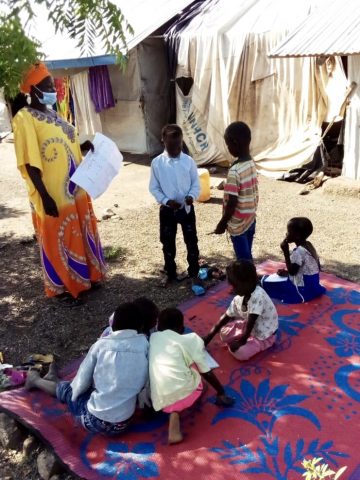
Teacher Hellen Okang supports small groups of learners with home learning during school closures. Photo: FCA
Young children can only thrive when learning in a conducive environment that prepares them to unleash their potential at an early age. Thus, their teachers require specialised training.
In collaboration with UNICEF Kenya, Finn Church Aid (FCA) put together a practical Early Childhood training that serves both young children and their families in Kalobeyei settlement in Kakuma refugee camp. The training was developed with Finnish teachers through the volunteer network Teachers without Borders.
The training focused on Early Childhood Development and Education (ECDE) pedagogy and didactics for pre-school teachers, targeting 25 teachers across five ECDE centres in the settlement and improving the quality of education for 3,555 learners enrolled in the ECDE centres.
Teacher Hellen Okang, 29, from South Sudan taught 125 learners at Joy Primary school in Kalobeyei before the Covid-19 pandemic disrupted learning in schools. Hellen participated in the training conducted in August and September 2020 and says it benefitted her immensely by improving her teaching skills.
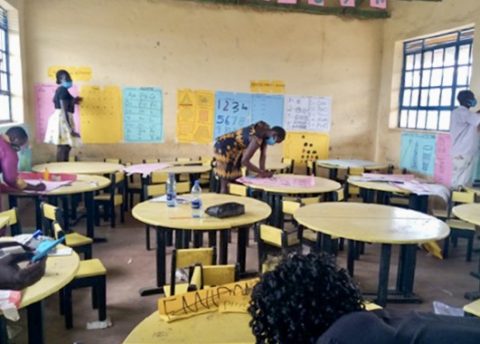
Teachers developing teaching materials for the ECDE centres in Kakuma. Photo: FCA
The training provided teachers with practical skills suited for crisis contexts and covered positive ways of disciplining children, curriculum and lesson planning, children’s rights, supporting numeracy and literacy skills, communication between teachers and caregivers and embracing a multicultural classroom.
“I began teaching in 2018 as a volunteer teacher. This training has gone a long way in helping me understand my learners and what it means to teach children in pre-school”, Hellen says.
The teacher training opened eyes for psychosocial support
The children that Hellen teaches have continued learning from home during school closures caused by the Covid-19 pandemic. 8-year-old James has tuned into radio lessons together with Hellen, who also is his neighbour. Teachers in the settlement complement the radio lessons by visualising the content on blackboards, helping learners to understand the lessons with recaps and following up on their homework.
“I would like to be a doctor to treat the sick when I grow up,” James says when asked about his dreams.
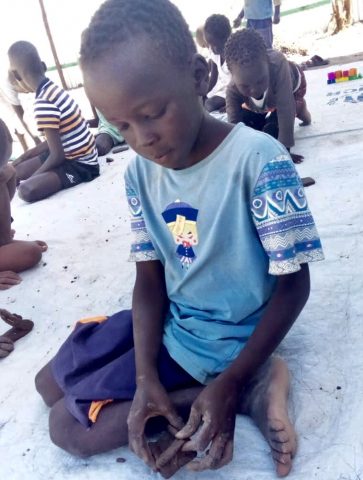
8-year-old James learns by playing and says he thinks his teacher Hellen is very welcoming and approachable. Photo: FCA
James’ mother Rose Aiira, describes her son as a soft-spoken boy who is quick and eager to learn new skills. When he enrolled in school in 2018, James only spoke his native South Sudanese language. Now thanks to teachers who speak his language as well as Arabic and English, he has drastically improved his language skills, particularly in Arabic. He also has friends of different nationalities, which supports his learning.
Teachers also use visual aids to help the children understand what they teach. The ECDE training emphasised the use of play as a method of practical content delivery and creating innovative ideas on developing attractive teaching and learning materials to capture the attention of learners.
“My learners love counting with songs. I cannot teach math without it”, Hellen emphasised.
Hellen says that the training opened her eyes to the importance of nurturing and caring for the children. According to her, she can now identify the psychosocial needs of learners and respond to them.
“I now understand each child uniquely, as individuals, and when they need stronger support I can refer them to the appropriate counselling service”, Hellen says.
Text: Elizabeth Oriedi, Catherine Angwenyi
In Kakuma Refugee camp in Kenya, Finn Church Aid together with UNICEF Kenya, supports 3,555 learners in six Early Childhood Development and Education centres and 7,992 learners in five Primary schools with access to education, teacher training and distance learning during the Covid-19 pandemic.
FCA to support quality education in Syria with USD 680,000 from Syria Humanitarian Fund
FCA will be supporting 4,000 crisis-affected children and youth in Hama area in Syria with access to quality education in a safe and protected environment.
Finn Church Aid (FCA) has been granted over 680,000 USD from the Syria Humanitarian Fund to support 4,000 children and youth to access quality education in Hama area, Syria.
After ten years since the war broke out, the Syrian refugee crisis remains the largest displacement crisis of our time. About 6.2 million people are displaced within Syria, and nearly 12 million people in the country need humanitarian assistance. At least half of the affected people are children.
The war has also left the education system in ruins. More than one in three schools are damaged or destroyed, and many are used for other purposes than education. Some schools operate in double or triple shifts to accommodate the massive influx of displaced children.
Meeting the needs requires collective efforts from national, regional and international educational actors, says Karam Sharouf, FCA’s Education Programme Manager in Syria.
“Education is the key to comprehensive human, economic and socially sustainable development. Therefore, continuous support should be provided to the education sector in Syria, and educational capabilities that could contribute to rebuilding Syria should be developed“, Sharouf says.
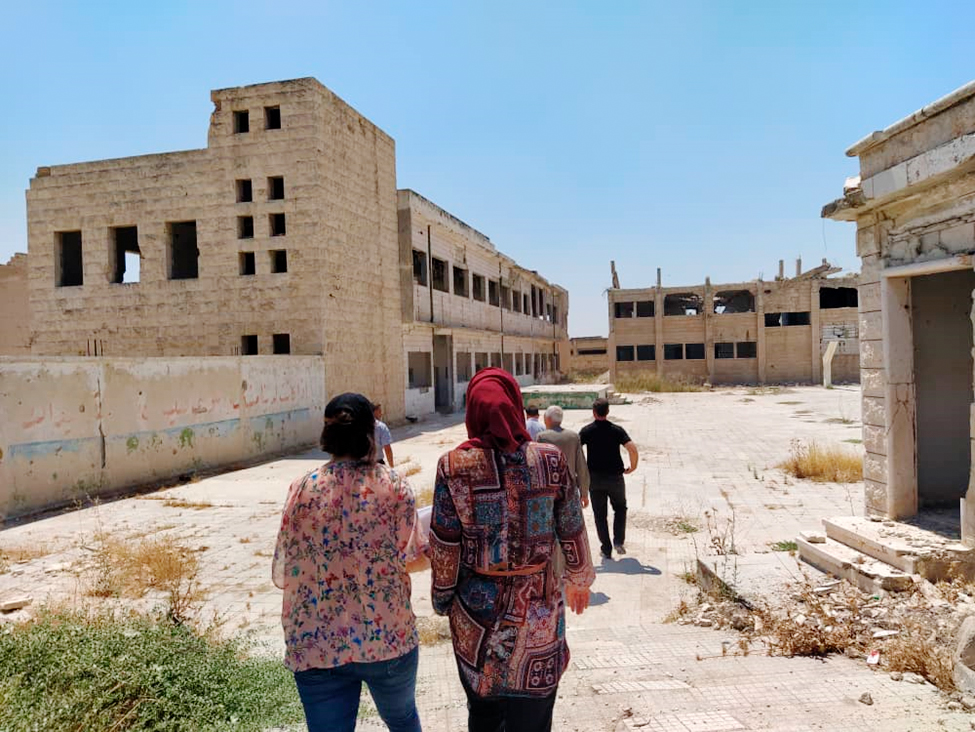
The war has destroyed or damaged many school buildings in Syria. Photo: Karam Sharouf.
Quality education through rehabilitating schools and training teachers
In the communities that FCA will support in rural Hama, approximately one thousand children are out of school, setting the enrolment rate at 77 per cent. Poverty and a lack of safety and security remain critical barriers to accessing education. Protracted displacement and limited economic opportunities have forced people in Syria to adopt negative coping strategies, including child marriage and child labour. This is usually more common in villages without schools, says Sharouf.
“There are many cases of early marriage, and many families rely on their children working due to the absence of the father, who might have died or travelled away“, Sharouf says.
Schools constitute a protected environment for children and enhance their well-being, but currently, schools are overcrowded. They also lack doors, windows, heating systems and learning materials. Sanitation facilities are largely unusable. FCA will rehabilitate school buildings to make them safe and accessible and construct inclusive and gender-sensitive sanitation facilities.
The need for teacher training is enormous as the number of teachers in Syria’s formal education system has declined by more than half in the past five years. The remaining teachers have not received systematic in-service training during the war, and newly recruited teachers often lack the required qualifications. FCA arranges teacher training that includes child safeguarding and psychosocial support, and equips schools with teaching materials and recreational kits, for example, craft materials and sports equipment.
The programme will also focus on ensuring access to quality education for children and youth through non-formal education, such as remedial classes and accelerated learning that helps learners to catch up with their age-grade after years out of school.
“These groups will be able to continue education and keep up with the academic achievement of their peers, thus reducing their chances of dropping out of school to a minimum“, Sharouf says.
FCA has substantial experience in providing quality education services, especially in emergencies, and is a solid partner of local actors already implementing education activities in Syria.
Teachers stay passionate despite closing of schools: Our priority is to keep learners motivated
Teachers around the world have played a vital part in the fight against the coronavirus throughout the pandemic. On World Teachers’ Day October 5, we want to appreciate all teachers for their tremendous efforts.
Covid-19 was declared a global pandemic on March 11, 2020, and forced schools to close in most parts of the world. Particularly in vulnerable communities, such as refugee settlements, teachers have found themselves in the frontline of the pandemic response.
Teachers raise awareness on Covid-19 and measures to curb the spread of the coronavirus. They have also adopted new ways of teaching in a situation where education must continue and distance learning remains the only solution. Countries like Uganda had to discover new ways of learning from home.
Due to limited internet access, refugee settlements in Uganda have relied largely on lessons broadcasted on radio. Finn Church Aid (FCA) has supported the government’s policies of social distancing and distance learning by distributing radios and home learning packages to learners and their families, also enabling them to follow updates on the Covid-19 situation.
FCA along with UNHCR Uganda, with funding from EU Civil Protection and Humanitarian Aid (ECHO) and Education Cannot Wait, distributed 1,403 radios and 141,825 home learning packages to learners in refugee settlements in Southwestern Uganda and the West Nile region.
Godfrey Baryakaijuka and Annet Rukundo have conducted radio lessons on Radio Nyumbani and supported home-based learning in Rwamwanja refugee settlement. They support the learners at their homes with working on their home learning packages that complement the broadcasts.
Godfrey Baryakaijuka, teacher
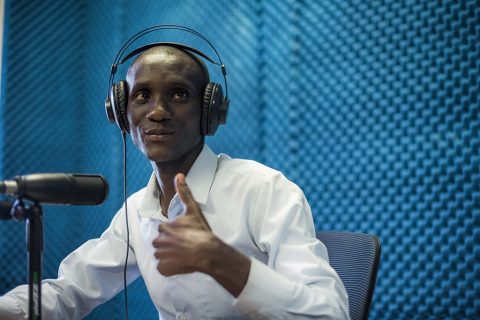
Photo: Hugh Rutherford / FCA
I walk from home to home, checking the assignments of learners and helping them with what they may find difficult. I sometimes walk very long distances as there are learners that stay in villages far away from me. The weather is not always favourable. It can be difficult to move when it is either too hot or if we are having heavy rains. On radio, I have conducted lessons on English and Mathematics for Primary 3 learners.
Teachers work hard to maintain the connection between the schools and the learners and to ensure that learning continues. I find that some learners have resorted to agriculture during school closure because of staying home for too long. I take it upon myself to approach these learners and encourage them. Teachers follow the procedures set to fight the Covid-19 pandemic and also remind families of the importance of social distancing and wearing masks.
I love being a teacher, not even school closure has affected my passion. I enjoy giving guidance to my students and being a source of comfort for them. Many of them ask me if schools will ever open or if they will ever see their friends at school. I keep reassuring them that there will be a day when they can all return to school.
My biggest priority during this pandemic is to keep learners motivated and eager to continue with their education regardless of the obstacles.
Annet Rukundo, teacher
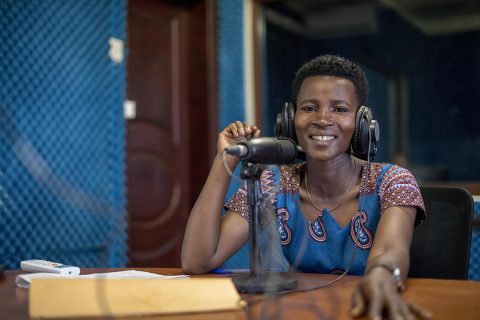
Photo: Hugh Rutherford / FCA
Most learners I interact with keep asking me when they can go back to school. It makes me very proud because I know that a lot of them want to return. Parents also show a lot of interest in their children’s learning. When there was a lockdown in the refugee settlement, most of the teachers also stayed at home. We were very happy when we were called back to teaching.
I have conducted radio lessons on English for Primary four and five over the radio. During my lessons, learners within the community would reach me via phone for further explanations while on air. Before the home learning packages were distributed and radio lessons conducted, I would see learners usually around the school playgrounds and compounds idle and doing nothing. The lessons have kept them engaged with learning at home.
One of the challenges of distance learning was that some learners had no access to radios. Some who did could not afford to buy airtime to their phones, and therefore could not call the teacher for further assistance. In addition, delivering lessons on the radio is teacher-centred and not learner-centred.
In a class, you are able to give learners more attention whereas, on the radio, you would not be able to know if what you are teaching is well understood or not. When it was time to receive calls on the live radio broadcasts, the lines would usually be busy. It was hard for learners to reach the teacher.
I am now conducting home-based learning within the community and reach out to learners in their homes. We teach from Monday to Thursday and on Friday, we teachers meet to review and discuss challenges and agree on a way forward. We also have inter-school meetings with other teachers to share experiences and work at improvising better teaching methods.
I am glad that schools gradually start opening on October 15 starting with candidate classes as decided by the government of Uganda. I know the learners are excited and this makes me happy.
Education remains key in any situation we might encounter.
The teacher interviews were conducted by FCA Uganda’s Communications Officer Sharon Shaba. FCA along with the UN Refugee Agency UNHCR supported learners in Rwamwanja refugee settlement with home learning packages and radios.
World Teachers’ Day celebrates teachers in crises: “When learners cannot come to school, we have to go to them”
World Teachers’ Day on October 5 celebrates teachers in crises. The Covid-19 pandemic has significantly added to the challenges of teachers to protect people’s right to education but teachers like 27-year-old Obang Omot Oboya ensure no one is left behind during school closures.
Mr Oboya teaches mathematics and science in Kakuma refugee camp in Kenya. Below, he explains how teachers stepped up to the challenge.
“The year 2020 brought along with it perhaps one of the biggest challenges that the world’s teachers have faced. Kenya is not an exception. Even teachers with decades of experience have had to learn something new: how do we support learners when they cannot come to school?
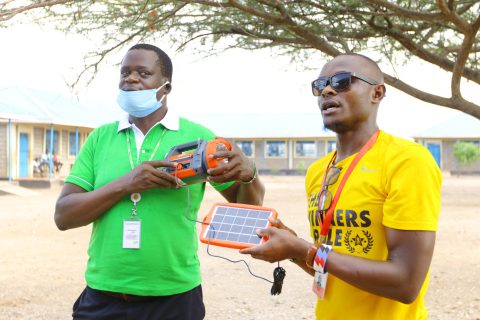
Finn Church Aid distributing solar-powered radios in Kakuma refugee camp.
Following the school closures, teaching in Kenya moved to radio broadcasts and virtual platforms. The first step for us was ensuring that learners in Kakuma refugee camp had access to the national broadcasts. FCA distributed radios to the families, and we worked together with agencies in finding new solutions to complement the radio lessons with recaps and homework.
Schools have assigned each teacher in Kakuma a cluster of groups with six learners per group. Six learners share one radio. The arrangement adheres to the social distancing guidelines of Kenya’s Ministry of Health as the FCA supported teachers accompany each group separately.
At the end of every lesson, the radio teacher usually gives assignments. We mark their homework, and this makes radio lessons more authentic.
As long as learners cannot come to school, we have to go to them.
Mathematical formulas need to be visualised
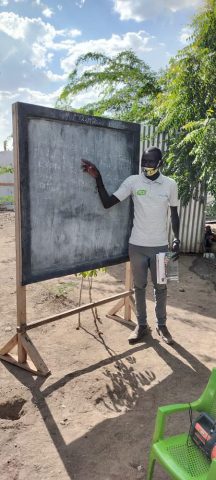
Mr Oboya visualises radio lessons on a blackboard.
The first days were challenging for both teachers and learners. As teachers, we are in the habit of being personally in touch with learners in the classroom, be it just going around and seeing what they are doing. This is not possible for the radio teacher. And for my part, my current role does not include, for instance, planning lessons. We rely on what the radio teacher prepares.
In the beginning, it was difficult to catch the interest of learners through the radio and get them into a radio class routine. We also had to help learners with tuning in to the right frequency.
To enable learners to be attentive during the radio lesson, I usually come with a blackboard and chalk for the purpose of demonstration. The learners have to see the mathematical formulas while they follow the radio lessons on math. This helps learners to be attentive.
I also break down lessons into segments and achievable goals, and I attend to each student individually to ensure that they grasp the concepts. By now, everyone has got the hang of it.
A fruitful collaboration between teachers and parents
The new ways of learning have also provided relief to both teachers and learners, compared to our usual setting. I can now attend to each learner’s needs differently compared to a classroom. It is easier to listen to a group of six learners at the time than to the 80 learners I used to teach in a classroom. Teachers can quickly identify and support, for instance, slow learners.
I now teach 48 learners per day, divided into eight groups. There are eight radio lesson per day, 35 minutes each, which means I give one lecture per group. The remaining 32 learners from my class are taught by parents who volunteer as teachers after training with FCA.
What has been most important is that the parents are also involved in their children’s learning process. We collaborate more with parents since they join us in accompanying the pupils during the radio lessons and ensure that their children do their assignments. Parents and teachers collaborate in motivating the children and monitoring that they do their homework.
We also collaborate more with the parents on WhatsApp for the children’s learning, for instance, by recording learning materials on our phones and sharing them with parents in WhatsApp groups that we have established. The learners have to use their parents’ devices.
Girls at risk during distance learning
There is, unfortunately, one function that the distance learning arrangements cannot fully address: schools typically constitute a safe space for children and youth, particularly girls.
When girls are in school, they are less likely to become victims of sexual abuse or be forced into marriage. During this pandemic, the school buildings cannot protect the girls.
Some of the learners I used to teach have become pregnant during the time schools have been closed. We conclude that our homes and camps are not safe when the children are idle.
The affected girls need psychosocial support and assistance in continuing with their education.
Teaching is a call and a passion. The best World Teachers’ Day gift I can give my learners in this year of the pandemic is my time and spirit of adapting to the distance learning.
I hope that my pupils will not let this episode blindly, that they will be more resilient and take the new norms as a way of life and achieve their goals.”
Teacher Obang Omot Oboya was interviewed by FCA Kenya’s Communications Intern Elizabeth Oriedi. FCA works with education in Kakuma refugee camp together with Unicef and UNHCR.
Hard-to-reach areas benefit from EU Humanitarian Aid funded quality education as schools reopen in Somalia
The project funded by the European Union fulfils the right to quality education for 4,000 crisis-affected children as schools reopen after Covid-19 related closures in Somalia.
With financial support from EU Civil Protection and Humanitarian Aid (ECHO), FCA and its partner GREDO kicked off an Education in Emergencies response in Hudur district of South West State of Somalia.
Over 4,000 children from the most vulnerable settlements of Internally Displaced People (IDP) are expected to access safe and protected learning environments in six primary schools and three Accelerated Basic Education (ABE) centres for the academic year 2020-2021.
Schools and learning institutions across Somalia were closed in March 2020 as a result of the Covid-19 outbreak but were allowed to reopen in August. FCA has worked with sensitising teachers and school administrations in line with the government’s Covid-19 guidelines to support the safe reopening of schools, says Aburas Farah, FCA’s Senior Education Advisor.
“We have encouraged everyone in the school and the community to practice preventive behaviours and enforce hygiene and social distancing in ways that are appropriate for learners, teachers, and staff”, Farah says.
Increase in enrolment of children in both primary schools and ABE centres
In close collaboration with the Ministry of Education of South West State, Hudur District Education Officers and local authorities, five public and IDP schools were jointly identified to provide primary education and ABE programme. An additional Public-Private Partnership with the private Shodoq Primary School was also secured to enable space for construction and set up of another ABE centre for drop-out, over-aged and out of school children.
Sites for the rehabilitation of damaged classrooms and the construction of a new temporary learning space were also verified. The construction process is expected to start soon.
Awareness-campaigns on the right to quality education have been carried out in August and September to inform the host and IDP communities to encourage caregivers to enrol their children in school – particularly girls and children with disabilities.
The campaigns have resulted in a sharp rise of enrolment in the six schools supported by EU Civil Protection and Humanitarian Aid (ECHO): a total of 4,127 children. Among those, 644 learners (305 boys and 339 girls) are the newly enrolled primary school learners and 585 learners (331 boys and 254 girls) registered in the three ABE centres for drop-out, overage and out-of-school children.
‘’Due to poverty and attacks from Al-Shabaab, many poor children in my community cannot enrol in schools. When I heard about FCA’s support to primary schools in Hudur, I was one of the first to register my children”, says Ali Adan Ahmed, a parent and community leader.
“I believe education will bring a bright future for my children”, he says.
The registration process for the most vulnerable children to access mobile cash transfer for school uniforms and scholastic materials is also carried out and closely monitored by the teams of FCA and GREDO, in close partnership with the DEO and Community Education Committees. The cooperation ensures a transparent and safe transfer process.
Teachers receive monthly incentives, training and mentorship
As the quality of education is the centre of this intervention, 80 teachers (50 primary and 30 ABE) were identified, recruited and provided with monthly incentives, with the support of officials of the Ministry of Education. The teachers are currently taking part in training, divided into smaller groups to enable effective learning and interaction.
The capacity-building support for the 50 primary teachers emphasises on learner-centred pedagogical skills using contextualised Teacher in Crisis Context training packs. Training for ABE teachers focuses on the same tools, coupled with an ABE Working Group Training Package.
The teachers were further sensitised on the guidelines of the safe reopening of schools in the context of Covid-19, circulated by the federal government to ensure the safe return to school of learners and teachers. After the training, the teachers will receive continued support through follow-up sessions and a mentorship programme that uses Teacher Learning Circles. The support aims to increase the quality of teaching and the performance of the learners.
Hudur District Education Officer, Adan Ahmed Mohamud, expressed his gratitude and appreciation of the timely and high-quality support of the EU to Somalia, especially to Hudur district where the needs and gaps in the education response are enormous.
“The support is a significant and life-changing opportunity for many children, especially those that have been denied their right to education due to insecurity and protracted crises. The assistance also helps reduce major concerns in the district, such as early marriage among girls and Al-Shabaab’s recruitment of child soldiers”, Mohamud says.